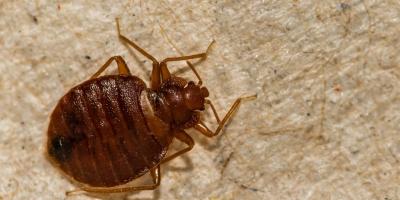Bed Bugs: Not Always Found in the Bed

While their name would imply that bed bugs are found in beds (and they certainly are!), beds aren’t the only place where you might encounter them. Not by a long shot. In fact, the number of places where bed bugs can hide or hitch a ride home with you is practically endless. When you consider the nature of bed bugs -- all they really need to survive is a blood source and shelter -- it’s no wonder that they can -- and do! -- make a home just about anywhere that people like to lounge.
Unfortunately, there is nothing you can do to completely eliminate the possibility of picking up bed bugs (short of completely isolating yourself from the rest of civilization); however, you can take some simple preventative measures whenever you find yourself in a higher-risk scenario, such as traveling, specifically while before staying in a hotel or other high-traffic sleeping area.
Bed Bugs Here, There, and Everywhere
In order to stand a chance against a pest as insidious as bed bugs, it’s a good idea to recognize where you might find them, other than the bed. Our homes and businesses provide plenty of places for bed bugs to thrive. Remember: all a bed bug needs to survive is a blood source—preferably human though not necessarily—and shelter from the elements. A good rule of thumb to keep in mind is this: bed bugs are found almost anywhere their host can live.
In your home, this might include upholstered furniture like couches, sofas, loveseats, recliners, and armchairs. Linens, curtains and drapes can also house bed bugs, as can baby cribs and pet mats, not to mention beloved books -- a problem facing public libraries. Historically, libraries have been safe havens for knowledge and readers in need of shelter, especially those who are down on their luck.
Speaking of libraries and public institutions, all sorts of businesses need to be aware of bed bugs, including retail shops, consignment stores, movie theaters, daycares, schools, and medical facilities. In addition, we know that hotels are potential hotbeds (pun intended) for bed bugs, but so are campsites and any other accommodations that are shared by travelers.
When it comes to traveling, any mode of transportation that includes upholstered seats, like airplanes, trains, and buses, can also pose a risk that a traveler might pick up bed bugs. And yes, your own car can get infested if you spend enough time there, especially if you sleep in or live out of it.
The good news is bed bugs don’t usually travel on people or spread via person-to-person contact, even though they can hitch a ride on clothing if the home infestation is particularly bad. Understanding bed bug behavior is half the battle when it comes to protecting yourself against them.
Be Smart About Bed Bugs
The name of the game when it comes to bed bugs is vigilance. Precautions go a long way to helping protect against bed bugs. Inspecting beds, furniture or potential purchases from secondhand shops and looking for signs of bed bugs, including dark or rusty-colored spots, eggs, eggshells, or shed skins, is smart. If possible, thoroughly washing and drying any retail or consignment purchases before wearing or storing them is ideal.
When you arrive to your hotel, place your luggage in the bathtub before starting your inspection, then keep it on the luggage rack provided by your host for the extension of your stay, just in case.
In public places, keep your belongings to yourself as much as possible, and store them in a plastic bin if you’re in a location that you know has reported bed bug issues in the past.
Keeping clutter to a minimum, both in homes and businesses, vacuuming regularly, and being proactive about possible bed bug sightings are all sound strategies to help minimize your risk of encountering bed bugs.
Business owners and management should also take steps to educate their staff about bed bug identification, ensuring that everyone understands how to identify the signs of an infestation before it impacts your bottom line or brand reputation.
For total peace of mind, it’s a good idea to have a pest control professional who knows how to find bed bug introductions early regularly inspecting your home or business… before they become a problem.
Find out more about how we can help keep your home or business bed bug free.



